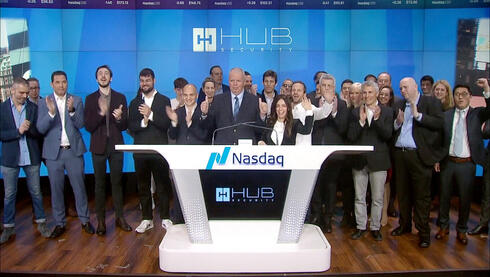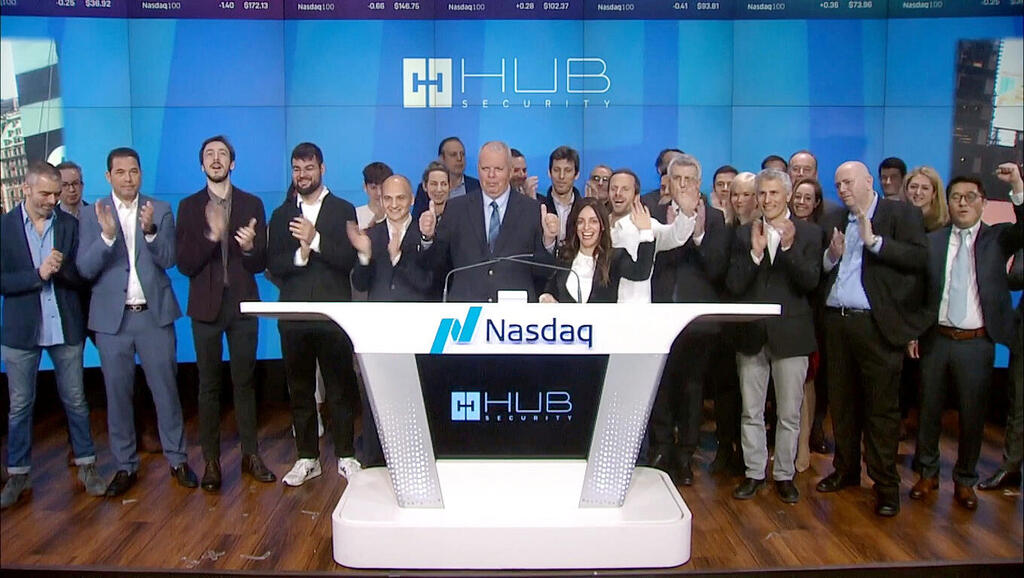
Hub Security entered Nasdaq at $1.3B valuation despite not having a mature product or significant sales, admits outgoing CEO
"There was no product and there were no sales. The product was not ready at all," said outgoing CEO Uzi Moscovich, who still serves as a director on Hub’s board. The cyber company has lost over 98% of its value since entering the Nasdaq 10 months ago, falling to a market cap of under $20 million
Did Israeli cybersecurity company Hub Security, founded seven years ago, possess a mature and proven product for sale when it went public last year? According to Uzi Moscovich, who served as CEO until a month ago, and is currently a director at the company after previously also serving as the chairman, the answer is no. The reports from the Nasdaq-traded cybersecurity company for the first half of 2023, published last week, revealed revenues of only $570,000 from cyber products. This figure reflects an annual sales rate of $1.1 million, significantly below the forecast presented by Hub Security in 2022 when it projected that cyber product revenues in 2023 would be around $92 million.
In a conversation with Calcalist, Moscovich admitted that when he entered the role of CEO “there was no product and there were no sales. The product was not ready at all." Moscovich emphasized that after eight months of work under his guidance, the company now has a mature product. Moscovich served as CEO from February 2023 until December, succeeding ousted founder Eyal Moshe. Moscovich previously served as the company's chairman for a year and now serves as a director on the board.
1 View gallery


Outgoing Hub Security CEO Uzi Moscovich (center) during the company's IPO.
(Photo: Nasdaq)
The year 2023 marked the second consecutive year in which Hub Security failed to meet its revenue forecasts. In 2021, the company predicted cyber product revenues of $38 million for 2022, but the actual figure was only $1.7 million. The former CEO attributes this failure to the fact that "at the time of the IPO on Wall Street, the company's flagship product existed and was being sold, but improvements were required, which indeed happened in the second half of 2023. The company today has a mature technology and product."
After leaving the CEO position in December, Moscovich returned to serve as a director, with Noah Hershcoviz appointed as the new CEO. During Moscovich's tenure, the entire senior management team at Hub Security changed, including in the finance, product, strategy, and operations departments. The company also moved from luxurious offices in the center of Tel Aviv to more affordable offices in east Tel Aviv.
Additionally, Hub Security signed a non-binding agreement to merge with another cybersecurity company—Blackswan Technologies. Moscovich notes that this company already possesses a mature product and real sales, operating in the data field. The merged company plans to offer data-related services, continue developing Hub Security's cyber product, and provide software and consulting services based on ALD, a company acquired by Hub Security in June 2021.
As of now, Hub Security's story is one of glorious failure. After completing a merger with an American SPAC in February 2023, the company was delisted from the Tel Aviv Stock Exchange, where it traded for only a year. The SPAC merger was valued at $1.3 billion, while Hub Security traded at a value of only $250 million in Tel Aviv at the time.
SPAC investors took advantage of their right to redeem their investment after the merger announcement, and PIPE investors also pulled out, leaving Hub Security short of cash. Instead of the anticipated $220 million, the entire procedure yielded only $4 million. Since the merger, Hub Security's stock has sharply declined, with the company's current value below $20 million.
In the absence of a cyber product, Hub Security reported a loss of $69 million in January-June 2023, more than three times the loss in the corresponding period. The loss deepened due to SPAC-related merger expenses of $40 million. Consequently, the company's operating cash flow (EBITDA), which neutralizes one-time expenses, stood at $5 million in January-June, reflecting an annual rate of $10 million—half of the 2022 loss of $21 million. The company's total revenues in the reported period were $31 million compared to $37 million in the corresponding period.
The reports for the first half of 2023 were significantly delayed, published last week instead of by the end of August as per regulations. The delay was attributed to the late publication of the 2022 reports in August.
Moscovich replaced founder Eyal Moshe as CEO after alleged suspicions arose regarding the reliability of the company's reports concerning two transactions during his time at the helm. In 2021, the company reported a joint venture for the sale of servers and the use of its software to a company controlled by Visa Global in the amount of NIS 81 million (approximately $21 million); and the second from 2022, during which the company purchased software from a European company, probably German, for $10 million, plus a contingent payment of $12 million.
Moshe and his partner Ayelet Bitan, who served as VP of Human Resources, left the company against the backdrop of an investigation that looked into suspicions that the couple used the company's funds for private needs, including the renovation of their home in Tel Aviv.
Moshe and Bitan planned to be the biggest beneficiaries of Hub Security's entry into Nasdaq. In mid-November 2022, Hub Security convened a shareholders' meeting in which the shareholders were supposed to vote on moves designed to "adjust the company to the standards of a public company traded on the Nasdaq stock exchange." Among other things, the shareholders were supposed to vote on changing the compensation policy and amending the options plan, leading to a five-fold jump in the total salary cost of Moshe and Bitan—from an aggregate cost of NIS 6.8 million per year to an aggregate cost of NIS 34.9 million per year. The company removed the issue from the agenda just before the vote, and the two were removed from the company close to the execution of the merger.













